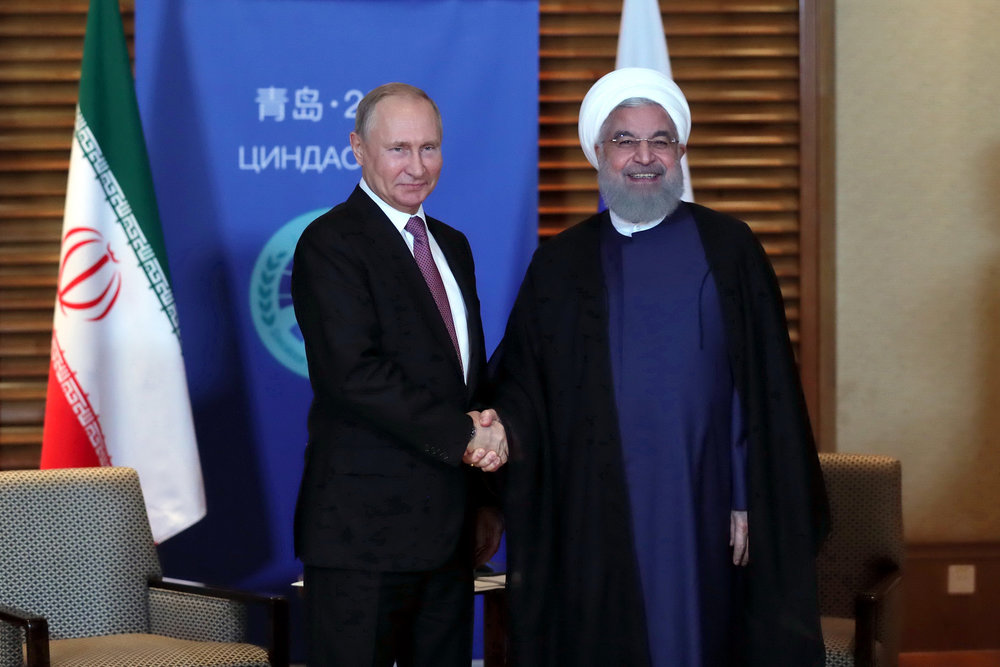Rouhani: More dialogue needed with Russia after U.S. nuclear deal exit

TEHRAN – President Hassan Rouhani of Iran said in a meeting on Saturday with his Russian counterpart Vladimir Putin that more dialogue is needed between Tehran and Moscow now that Donald Trump has withdrawn the U.S. from the multilateral 2015 nuclear deal.
Rouhani and Putin met in Qingdao, China, where the Shanghai Cooperation Organization summit meeting is being held.
The SCO meeting comes at a time that Trump unilaterally pulled Washington out of the international nuclear pact with Iran.
“As for the United States’ illegal walkout from these agreements, a far more serious and important dialogue between our countries is required,” TASS quoted Rouhani as saying.
Rouhani noted that Moscow can play an important role in preserving the nuclear deal, known as the Joint Comprehensive Plan of Action, after the U.S. “unilateral” and “illegal” withdrawal from the agreement.
On May 8, Trump officially withdrew the U.S. from the UN-endorsed nuclear agreement and plans to reimpose sanctions on Iran.
After the U.S. withdrawal, Iran wants assurances from the remaining parties that its interests are guaranteed or it will resume nuclear activities with a higher speed.
Rouhani also thanked Putin for his support for Iran’s accession to the Shanghai Cooperation Organization.
“I want to express my gratitude for your position on Iran’s accession to this organization as a full-fledged member,” TASS reported him as saying.
Putin said Iran has cooperated well in the SCO as an observer and that Russia supports Iran’s full membership to the organization.
The SCO, a regional security bloc, is led by China and Russia. Its member states also include four ex-Soviet Central Asian republics, Pakistan and India. Iran is an observer member.
According to France 24, authorities emptied an entire oceanside swathe of Qingdao -- clearing out shopkeepers, residents and day-trippers to make way for Chinese President Xi Jinping and his Russian and Iranian counterparts. Pakistani President Mamnoon Hussain and India's Prime Minister Narendra Modi also attended the meeting.
Though not officially on the agenda, analysts say that one key topic of discussion this year may focus on whether Iran will be allowed to ascend from its position as an SCO observer to become a full member state -- a development it has sought since 2008 but has been unable to achieve while subject to UN sanctions.
The 2015 nuclear deal lifted that barrier.
Now in the wake of the U.S. withdrawal from the pact, "SCO members may use granting full membership to Iran as a way to demonstrate support for (Tehran) and the nuclear agreement," said Dawn Murphy, professor of international security studies at the U.S. Air War College.
Trade, investment and development cooperation issues will also feature prominently at the SCO, Murphy said, given the climate of "rising anti-globalization and strains on global multilateral economic institutions", stoked by Trump's nationalist "America First" policy.
SCO nations may discuss the potential of a joint free trade area, she said, as China also pushes for participation in its Belt and Road global infrastructure project.
"Member states of the SCO are key to the success of the Belt and Road initiative and China's growing influence as a Eurasian power," said Murphy.
China may, however, be hindered from gaining robust support for its project at this summit due to India, the only SCO member that does not endorse it, she noted.
Regional security issues will also feature, because terrorism is the most severe security challenge facing the SCO, according to Liao Jinrong, head of the Chinese ministry of public security's international cooperation department.
"No matter what country has terrorists, we must strengthen our regional cooperation and not allow them to affect regional security," he told a press conference Friday, adding that the SCO bloc had stopped "hundreds" of terrorist acts.
NA/PA
